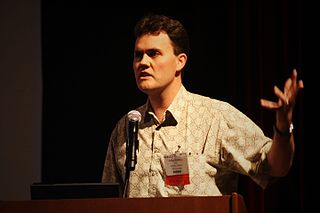A Quote by Stephen Wolfram
The thing that got me started on the science that I've been building now for about 20 years or so was the question of okay, if mathematical equations can't make progress in understanding complex phenomena in the natural world, how might we make progress?
Related Quotes
We've got to control our own energy. Now, not only oil and natural gas, which we've been investing in; but also, we've got to make sure we're building the energy source of the future, not just thinking about next year, but ten years from now, 20 years from now. That's why we've invested in solar and wind and biofuels, energy efficient cars.
We need to make sure that the laws we're passing are protecting people. And we should not be voting against something that makes progress just because it doesn't make as much progress as we'd like to see made. As much as I might like to see any number of issues progress in larger steps, I understand that some of these things happen in smaller steps. And so for that reason, progress is progress. And success is success.
There’s this thing called progress. But it doesn’t progress. It doesn’t go anywhere. Because as progress progresses the world can slip away. It’s progress if you can stop the world slipping away. My humble model for progress I the reclamation of land. Which is repeatedly, never-ending retrieving what it lost. A dogged and vigilant business. A dull yet valuable business. A hard, inglorious business. But you shouldn’t go mistaking the reclamation of land for the building of empires.
It's weird because there is progress somehow. But there's so much that just feels the same. How important is that rank? How important is it that I am allowed to make these decisions? What does that really mean? What is progress? Is it progress that a black guy gets to push a button for the nuclear bomb? Is that progress? Maybe, I don't know.
One can truly say that the irresistible progress of natural science since the time of Galileo has made its first halt before the study of the higher parts of the brain, the organ of the most complicated relations of the animal to the external world. And it seems, and not without reason, that now is the really critical moment for natural science; for the brain, in its highest complexity-the human brain-which created and creates natural science, itself becomes the object of this science.
I think in terms of getting new artists who are not in that sort of stereotypical teenage boy demographic; there's been a lot of progress recently. And I shouldn't make a definitive statement about this, but my impression is that the main impediment to progress in that regard is the number of people who are choosing to make a go of it.
LinkedIn's got a little progress bar. It wants you to do things like sign up 10 of your friends. It does that near the end. At the beginning it's like, 'You put in your name. 20 percent progress! How about some other information?' People want to fill in that progress bar. They like to complete a task. They like to check a box.
The physicist, in his study of natural phenomena, has two methods of making progress: (1) the method of experiment and observation, and (2) the method of mathematical reasoning. The former is just the collection of selected data; the latter enables one to infer results about experiments that have not been performed. There is no logical reason why the second method should be possible at all, but one has found in practice that it does work and meets with reasonable success.
If there is such a thing as philosophical progress, then why - unlike scientific progress - is it so invisible? Philosophical progress is invisible because it is incorporated into our points of view. What was torturously secured by complex argument comes widely shared intuition, so obvious that we forget its provenance.



































